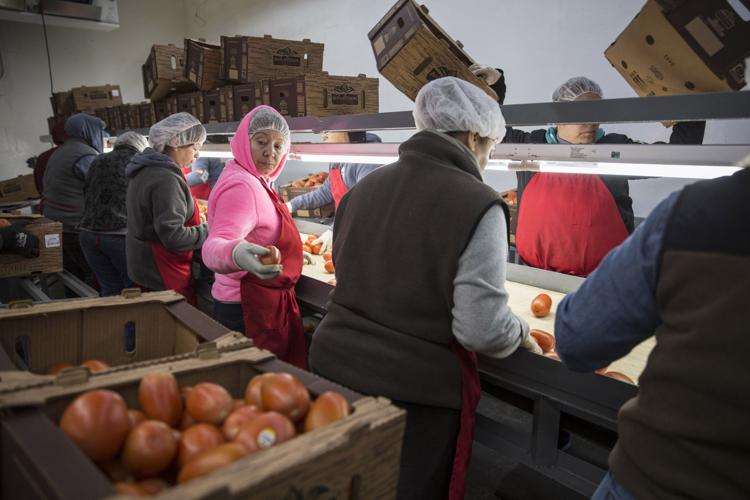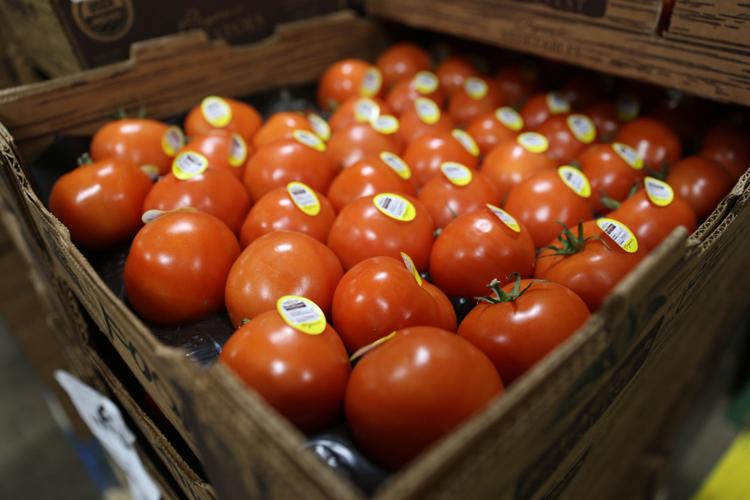IMURIS, Mexico – Mexican music blares over the speakers of a greenhouse located in Sonora, an hour drive south of the border, where workers tend to 60,000 tomato plants with bunches of fruit just turning scarlet. The destination after harvest: grocery stores across the United States.
Francisco Landell, the general manager of the greenhouse operation, said Sonora’s climate is ideal for growing tomatoes and other produce.
“Right here you can see we have plenty of sunlight year round,” he said. “So if this is the ideal condition we should plant these vegetables here. It’s like, why do they plant corn in Iowa? Because it grows really well. It’s the best place to have corn. So why would I put cucumbers in Iowa?”
This greenhouse is one of many on the property, where Wholesum Harvest, a family-owned binational company that specializes in organic, fair-trade produce, grows several types of tomatoes, zucchini, yellow squash and cucumbers.
The company also grows vegetables further south in the state of Culiacan, and that produce eventually crosses the border to be packaged in Nogales, Arizona.
It’s that border crossing, usually a routine part of the produce industry, that has companies like Wholesum Harvest worried about a proposed 20 percent tax on products from Mexico.
Last month White House Press Secretary Sean Spicer mentioned a 20 percent tariff, levied on Mexican goods, as a possible way Mexico could pay for the border wall which is estimated to cost around $20 billion. He later said this tariff was only one of many options to finance the wall.
Jessie Gunn, a spokeswoman for Wholesum Harvest, said increasing the cost of Mexican imports would dramatically affect the produce industry and could make it harder for low-income Americans to afford healthy food.
“Produce doesn’t operate on a huge profit margin, we operate on a fairly conservative one,” Gunn said over the noise of the Nogales packaging facility, as workers examined and boxed tomatoes going by on a conveyor belt.
“A lot of it is about moving numbers, not making a huge margin on one shipment. So we can’t really absorb that kind of increase. It’s going to have to be passed on.”
Gunn said she also fears the impact of an import tax on American farmers if a tax leads to a trade war. Mexican Senator Armando Rios Piter suggested in mid-February that Mexico should boycott American corn and buy it from other countries instead.
“We have a very symbiotic relationship with American ag and American farmers, so you’re going to hurt American farmers who are already heavily subsidized because there will of course be some sort of reaction if they can’t export their grow crops to Mexico,” she said.
The United States sold $2.3 billion worth of corn to Mexico in 2015, making it the U.S.’s No. 1 agricultural product exported to the country, according to the U.S. Department of Agriculture. Tomatoes are the top agricultural export from Mexico to the U.S., according to the Fresh Produce Association of the Americas.
Sabrina Hallman, CEO of Sierra Seed Company which provides seeds to farms in Mexico, said the proposed tax has agricultural companies worried and cautious about making plans for the future. She attended a national conference in January and the topic of the border tax kept coming up, she said.
“No one in Mexico is planning on putting any new money into growing or building new greenhouse structures because you just don’t know what’s going to happen,” she said. “Because of the uncertainty we anticipate that our business will probably reduce within the next year. We’re just not going to sell as many seeds because growers aren’t going to be as prolific and be planting for a market when they don’t know what will happen.”
The highest volume of produce grown in Mexico imported to the U.S. crosses the border at Nogales, Arizona, according to a report by the Fresh Produce Association of the Americas.
Mexico is the third-largest trading partner for the U.S. with $583.6 billion in goods and services traded between the two nations in 2015, according to the Office of the United States Trade Representative. Mexico is Arizona’s top foreign trading partner.
Additionally, House Republicans proposed a 20 percent tax on corporate imports from all countries as part of a corporate tax reform package, which was actually unveiled in June. The proposal aims to create a “border adjustment tax” by making corporate domestic purchases tax-deductible while imported purchases would not, effectively levying a 20 percent tax on companies that purchase imported goods.
Victor Riches, president of the conservative Goldwater Institute, said that unless Congress’s import tax is offset by other measures, it would raise prices for American families.
“Consumers in the United States would see the prices of goods that are produced in Mexico but consumed in U.S. would go up, probably by that 20 percent,” he said. “So if they’re talking about this in the context of a larger tax plan and I’m not sure of the conversation in Washington … in which we would dramatically decrease corporate income tax, decrease the personal income tax, in that case the overall effect would likely be positive but it really does depend on the context.”
Dennis Hoffman, an economics professor at the W. P. Carey School of Business at Arizona State University, said this import tax is an effort by Congress to raise revenue elsewhere so lawmakers can cut tax rates within the U.S.
“It’s not a nonsensical thing to do but the problem is imposing it right now will be very disruptive,” he said. “The American consumer, we’re all accustomed to buying apparel and retail goods very, very cheap and changing that by raising prices of all those things dramatically is going to be disruptive.”
Some economists have speculated that an import tax would increase the value of the dollar and offset the increase in goods, but Hoffman said the economy would still be impacted because of the time it takes for the dollar to strengthen and the export industry would be negatively impacted if U.S. goods are more expensive abroad.
But a border tariff on Mexican goods would be detrimental to American consumers and businesses alike, he said.
“The thought that you can impose a tariff unilaterally and not have other countries retaliate is something that is unprecedented in history. Countries will retaliate so they’ll put tariffs on our exports,” Hoffman said. “At the end of the day if we all have less because we’re paying these tariffs and higher prices … then there’s less demand for all businesses. So I don’t see how you grow jobs and grow the economy by putting additional frictions on the trade of goods and services across borders.”







